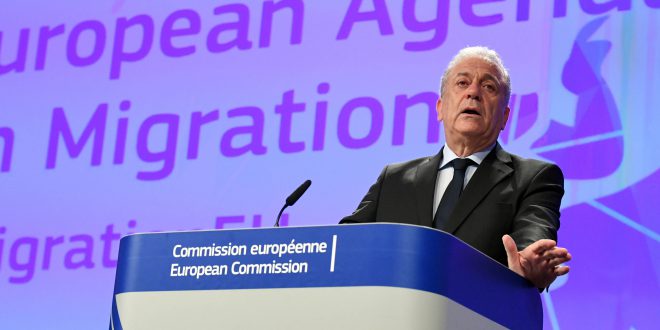The European Commission is piling on pressure for member states to send unwanted migrants packing, including children, and lock up those at risk of disappearing before deportation.
Dimitris Avramopoulos, the EU commissioner for migration, told reporters on Thursday (2 March) that EU states should not hesitate to detain anyone at risk of absconding for the maximum legal limit of 18 months allowed under EU law.
“In certain countries, the maximum length duration set by national law is much shorter, the result is that the detention period is not long enough to complete successfully the readmission process,” he said.
He went on to say that detention could also include children who would otherwise risk falling into the hands of criminals.
“Closed centres can help to protect children against smugglers, traffickers, people who want to abuse them,” he added.
The commission has earmarked around €200 million for 2017 to help finance the return of migrants across the EU states and wants the new EU Border and Coast Guard Agency to negotiate deals with commercial airlines to send people home.
These plans will feed into broader discussions next week in Brussels when EU leaders meet for a two-day summit. Draft conclusions seen by EUobs demand governments to implement the return plans as swiftly as possible.
Not everyone is convinced by the proposals.
Picum, a Brussels-based NGO working on undocumented migrants, said in a statement the Commission’s scheme would end up traumatising children and divide families.
“The European Commission is hiding behind the language of ‘efficiency’ to present measures that violate EU and international law,” said Picum’s director Michele LeVoy.
Amnesty International’s EU office has also denounced the plans.
“That children are included in this wide detention regime is truly shocking,” said Amnesty’s director Iverna McGowan.
Readmission, returns
The commission says the measures are needed to dissuade irregular migration, in spite of outstanding issues in getting African countries to accept the return of their unwanted nationals in the first place.
Among them is Nigeria whose nationals lodged some 46,000 asylum applications last year, but whose recognition rate hovers only around 8 percent. The EU has no readmission agreement with Nigeria.
The issue has frustrated officials who are yet to convince their counterparts in African states to accept the validity of a so-called European Travel Document issued to people who do not have IDs but cannot legally remain in the EU.
Officials are also struggling to secure readmission agreements with some countries in Africa while others stand accused of only accepting voluntary returns from EU states that are willing to pay.
The EU commission says it is ready to use “collective leverage”, similar to an October deal with Afghanistan, to force origin countries in Africa to accept returns and readmission.
It also says that EU states are not doing enough in terms of returns, noting that some 1 million people are likely not to qualify for asylum out of the 2.6 million applications lodged between 2015 and 2016.
Excluding returns to Western Balkan countries, the effective return rate throughout the EU was only 27 percent in 2015.
Most of those rejected are likely to be in Germany following a surge in arrivals over the past few years.
Germany’s chancellor Angela Merkel is hoping to convince authorities in Egypt and Tunisia to help prevent people from disembarking from Libya towards Italy.
She is meeting with Egyptian president Abdel Fattah al-Sisi in Cairo on Thursday and then with Tunisian president Beji Caid Essebsi on Friday.
Nikolaj Nielsen/EUobserver
 THE AFRICAN COURIER. Reporting Africa and its Diaspora! The African Courier is an international magazine published in Germany to report on Africa and the Diaspora African experience. The first issue of the bimonthly magazine appeared on the newsstands on 15 February 1998. The African Courier is a communication forum for European-African political, economic and cultural exchanges, and a voice for Africa in Europe.
THE AFRICAN COURIER. Reporting Africa and its Diaspora! The African Courier is an international magazine published in Germany to report on Africa and the Diaspora African experience. The first issue of the bimonthly magazine appeared on the newsstands on 15 February 1998. The African Courier is a communication forum for European-African political, economic and cultural exchanges, and a voice for Africa in Europe.


































